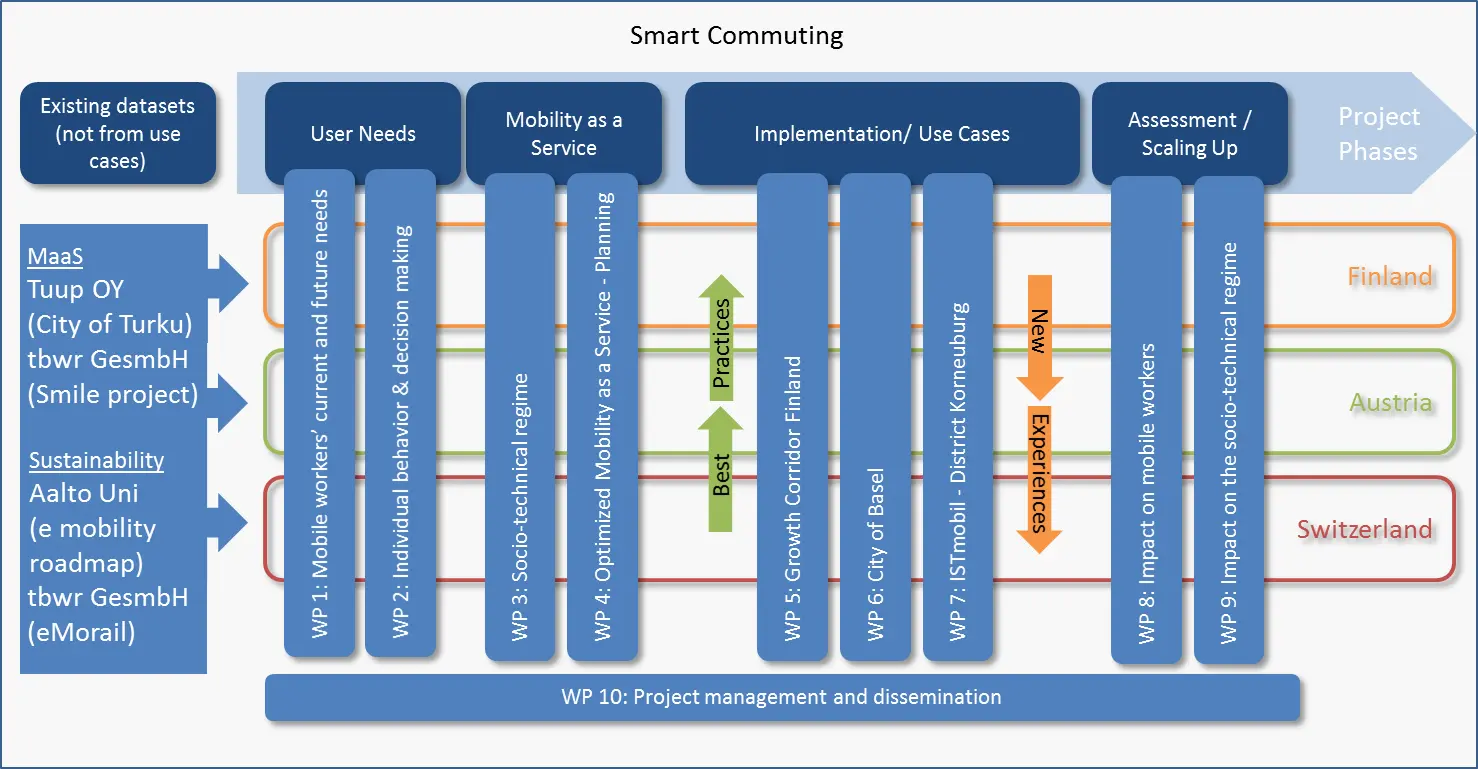Smart Commuting
Mobility needs in Switzerland continue to increase with economic development and settlement growth. Rising incomes, an active lifestyle and the increase in population as a result of migration contribute further to these developments. This trend has consequences for society and the economy: long or cumbersome commuting can reduce labour productivity and restrict time for other activities such as leisure, recreation or family. The increasing number of commuters and ever-increasing commuting distances are also pushing existing transport systems to their capacity limits, increasing energy consumption and emissions that are harmful to health and the environment. As a result, labour mobility is increasingly generating negative impacts on social, economic and ecological areas. The relevance of this topic is steadily increasing, especially in heavily congested metropolitan areas. Cities with a high proportion of commuters such as Basel have to adapt their mobility strategies to these changed conditions. Opportunities presented by new technologies can be exploited to improve the sustainability of mobility systems. In particular, the applicability of intermodal planning and booking systems such as "Mobility-as-a-Service (MaaS)" will be examined in this project.
The objective of the project "Smart Commuting" is 1. to identify the potential for energy and CO2 emission reduction in the area of commuter mobility, 2. to identify starting points for a change towards sustainable mobility and 3. to develop strategies for sustainable mobility for individual mobility behaviour as well as for companies and urban transport and mobility planning.
The project follows an integrative approach to developing commuter mobility solutions. Developments in society and the working environment are taken into account as a reason for the demand for mobility and as a starting point for concrete measures. The aim is also to support decision-makers from politics and planning in order to shape the change process towards sustainable mobility.
The Smart Commuting project is funded under the ERA-NET Smart Cities and Communities (ENSCC) funding programme. The Swiss contribution is financed by the Swiss Federal Office of Energy (Bundesamt für Energie, BFE). In three case studies in Finland, Austria and Switzerland, data will be collected, comparatively analyzed and the results put into practice.
Commuters' needs and stakeholder analysis
In order to support the systemic change on the levels of individuals, transportation systems and society, knowledge about individual and group behavior and decision making is crucial. The goal is to provide the needed knowledge for different actors shaping the systemic change towards new mobility services. Results are utilized in the implementation projects – for example in supporting commuting policy and projects in the city of Basel – but they are also transferable to other cities in Europe.
Individuals’ (considering different user groups) and stakeholders’ needs, motivation and network structure will be analyzed based on a multi-stakeholder approach. The work will include a meta-study combined with an analysis of empirical data from the city of Basel, integrating quantitative statistical and qualitative research methods. In order to ensure sustainability of developed tools, the ongoing change - e.g. in the field of technology, lifestyle or work - will be considered in a foresight study identifying trends and decision makers’ perception of them. In addition, we generate knowledge about stakeholder networks and approaches for moderating the cooperation process (e.g. for joint mobility management of companies and cities). In order to support the systemic change in all three levels (individuals, transportation system and society) mentioned above, design principles for mobility services, concepts for mobility management and recommendations for the implementation of technological solutions in order to increase user acceptance will be developed. Thus policy and planning measures, pricing schemes, business models, and communication during different phases of market introduction of these new solutions will be addressed.
At a glance
Department/Institute:
Project partners:
- Aalto University
- AIT Austrian Institute of Technology GmbH
- tbw research GesmbH
- Office of Mobility in the canton of Basel-Stadt
- ISTmobil GmbH
- Liikennevirta Oy
- Tuup Oy
- AC2SG Software Oy
- Suomen kasvukäytävä verkosto (Growth Corridor Finland)
Project leader ZHAW:
- Dr. Merja Hoppe
Team:
- Fabian Härri
- Raphael Hoerler
Project financing: Swiss Federal Office of Energy (SFOE), ERA-NET, JPI urban europe
Project status: finished
